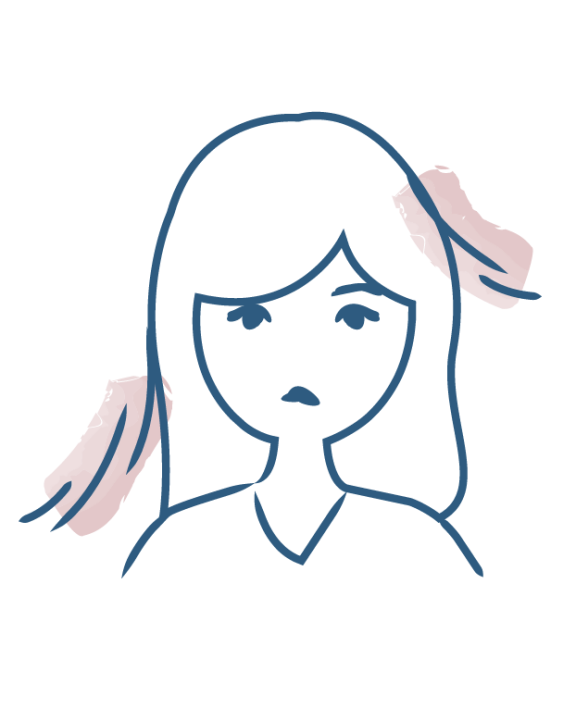What is hair loss?
Diffuse hair loss
- The causes of hair loss
- Secondary syphilis and hair loss
- Spot baldness and hair loss
- Scarring alopecia
- Hair loss due to ringworm of the scalp
- Hair loss and Covid
- Hair loss and the pill
- Pregnancy and hair loss: everything you need to know
- Hair loss and menopause
- Hair loss due to stress: reactional hair loss
- What is traction alopecia?
- Hair loss: the impact of iron, zinc, vitamin D, C and B12 deficiencies
- Drug-induced hair loss
- Hair loss and hormones
- Hair loss and genetics
- Hair loss and fatigue

Diffuse hair loss
Diffuse alopecia is a pathology which can affect the entire head. What are the causes and symptoms of this condition?
How to recognize diffuse hair loss
This type of hair loss is distributed evenly over the entire head. It is characterized by a loss in overall density and volume throughout the entire scalp.
It may appear as occasional hair loss, lasting less than six months, and is totally or partially reversible. It may also appear as chronic hair loss brought on either by persistent acute loss or by a general metabolic or endocrine cause.
A localized form of alopecia also exists, which, if extensive, can be diffuse. This last form, which professionals refer to as androgenetic alopecia, is typically limited to certain areas of the scalp. The most commonly affected areas include the crown and temples for men, and the crown and hairline for women.
How to treat diffuse alopecia in men and women
Is it possible to treat diffuse alopecia effectively? Once again, it all depends on the nature of the hair loss. In the case of acute or chronic hair loss for which the causes have been identified, treatment consists of addressing the factors that may be triggering the alopecia.
With regard to managing androgenetic alopecia, two types of medicinal treatments have been validated:
- minoxidil and anti-androgen medications such as finasteride (for men only). They can be prescribed by a dermatologist specializing in the scalp for cases of androgenetic alopecia and diffuse alopecia in women and men.
- hair transplant, the most long-lasting and most expensive solution. Common among men, increasingly more women are also turning to this solution to treat diffuse alopecia. This is evidenced by the fact that the number of female hair transplants has tripled since 2004.
* Source: Blume-Peytavi et al., 2011; Norwood, 1975
More information
- Discover Chronic loss of hair density
What is hair loss?
Chronic loss of hair density
- Discover Localized hair loss
What is hair loss?
Localized hair loss
- Discover Hair loss in women
What is hair loss?
Hair loss in women
- Discover Hair loss in men
What is hair loss?
Hair loss in men
- Discover Androgenetic alopecia in women and men
What is hair loss?
Androgenetic alopecia in women and men
- Discover The hair's life cycle
What is hair loss?
The hair's life cycle
- Discover Everything you need to know about seasonal hair loss
What is hair loss?
Everything you need to know about seasonal hair loss
Our care routines
Loss of hair density, thinning hair
- Discover MY HAIR DENSITY LOSS ROUTINE FOR WOMEN (OVER 6 MONTHS)
MY HAIR DENSITY LOSS ROUTINE FOR WOMEN (OVER 6 MONTHS)
- Discover MY ROUTINE AGAINST CHRONIC HAIR DENSITY LOSS IN MEN (OVER 6 MONTHS)
MY ROUTINE AGAINST CHRONIC HAIR DENSITY LOSS IN MEN (OVER 6 MONTHS)
- Discover Anti-reactional loss of hair volume for post-pregnancy and breastfeeding women
Anti-reactional loss of hair volume for post-pregnancy and breastfeeding women
- Discover MY OCCASIONAL HAIR DENSITY LOSS ROUTINE FOR WOMEN (LESS THAN 6 MONTHS)
MY OCCASIONAL HAIR DENSITY LOSS ROUTINE FOR WOMEN (LESS THAN 6 MONTHS)
- Discover MY OCCASIONAL HAIR DENSITY LOSS ROUTINE FOR MEN (LESS THAN 6 MONTHS)
MY OCCASIONAL HAIR DENSITY LOSS ROUTINE FOR MEN (LESS THAN 6 MONTHS)
Dermatological expertise
To better understand your skin and hair, discover our exclusive content and innovative care products designed to improve your quality of life..


